Why there is no peace treaty with Japan
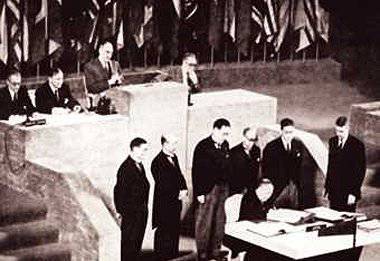 57 years ago, Soviet-Japanese diplomatic relations were restored.
57 years ago, Soviet-Japanese diplomatic relations were restored.In the Russian media, it is often possible to find a statement that Moscow and Tokyo are allegedly still at war. The logic of the authors of such statements is simple and straightforward. Since the peace treaty between the two countries is not signed, they "reason", the state of war continues.
Those who take to write on this issue have never had a chance to ask a simple question how diplomatic relations between the two countries can exist at the level of embassies while maintaining the “state of war”. Note that Japanese propagandists interested in continuing endless "negotiations" on the so-called "territorial issue" are also in no hurry to dissuade both their own and the Russian population in the opposite, so lamenting about the "unnaturalness" of the situation with the absence of a peace treaty for half a century. And this is despite the fact that the 55 anniversary of the signing of the Joint Declaration of the USSR and Japan on October 19 from October 1956 in Moscow is celebrated on these days, the first article of which declares: “The state of war between the Union of Soviet Socialist Republics and Japan ends by virtue of this Declaration, and peace and good-neighborly friendly relations are restored between them. ”
The next anniversary of the conclusion of this agreement gives a reason to return to the events of more than half a century ago, to remind the reader, under what circumstances and for whose fault the Soviet-Japanese, and now the Russian-Japanese peace treaty has not yet been signed.
Separate San Francisco Peace Treaty
After the end of World War II, the creators of American foreign policy set the task of removing Moscow from the post-war settlement process with Japan. However, the US administration did not dare to completely ignore the USSR in preparing a peace treaty with Japan - even the closest allies of Washington could not oppose this, not to mention the countries - victims of Japanese aggression. However, the American draft of a peace treaty was handed over to the Soviet representative at the UN only in order of familiarization. This project was obviously of a separate nature and provided for the preservation of American troops on Japanese territory, which caused protests not only from the USSR, but also from the PRC, the DPRK, the Democratic Republic of Vietnam, India, Indonesia, Burma.
The conference to sign the peace treaty was scheduled for September 4 1951, and San Francisco was chosen to be the place of the signing ceremony. It was about the ceremony, because any discussion and amendment of the treaty text drafted by Washington and approved by London were not allowed. In order to stamp the Anglo-American blank, the list of participants was chosen, mainly from pro-American countries. A “mechanical majority” was created from countries that did not fight with Japan. Representatives of 21 Latin American, 7 European, 7 African states were convened in San Francisco. The countries that had fought with the Japanese aggressors for many years and which suffered the most from them were not allowed to attend the conference. They did not receive invitations from the PRC, the DPRK, the FER, the Mongolian People's Republic. In protest against ignoring the interests of Asian countries in the post-war settlement, in particular, on the problem of Japan’s payment of reparations, India and Burma’s delegations refused to send their delegations to San Francisco. Indonesia, the Philippines, and the Netherlands also made claims for reparations. An absurd situation was created, when the majority of the states that fought with it turned out to be out of the peace settlement process with Japan. In fact, it was a boycott of the San Francisco Conference.
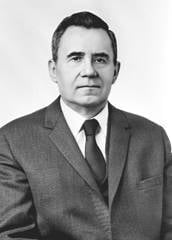 A. A. Gromyko. Photo ITAR-TASS.
A. A. Gromyko. Photo ITAR-TASS.However, this did not embarrass the Americans - they were firmly headed for concluding a separate treaty and hoped that in the current situation the Soviet Union would join the boycott, giving the United States and its allies complete freedom of action. These calculations were not justified. The Soviet government decided to use the rostrum of the San Francisco Conference to expose the separate nature of the treaty and put forward the demand "to conclude a peace treaty with Japan that would truly meet the interests of a peaceful settlement in the Far East and contribute to the consolidation of universal peace."
The Soviet delegation headed in September 1951 at the San Francisco Conference, headed by USSR Deputy Foreign Minister A. A. Gromyko, had directives from the Central Committee of the CPSU (B.) "To focus mainly on the issue of inviting the People's Republic of China to participate in the conference." At the same time, the Chinese leadership was informed that without satisfying this demand, the Soviet government would not sign the document drawn up by the Americans.
The directives also envisaged seeking amendment on the territorial issue. The USSR spoke out against the fact that the US government, contrary to the international documents signed by it, primarily the Yalta Agreement, in fact refused to recognize in the treaty the sovereignty of the USSR over the territories of South Sakhalin and the Kuril Islands. “The project is in gross contradiction with the obligations regarding these territories assumed by the United States and Britain under the Yalta Agreement,” Gromyko said at the San Francisco Conference.
The head of the Soviet delegation, explaining the negative attitude to the Anglo-American project, outlined nine points on which the USSR could not agree with him. The position of the USSR was supported not only by the allied Poland and Czechoslovakia, but also by a number of Arab countries - Egypt, Saudi Arabia, Syria and Iraq, whose representatives also demanded that the indications that a foreign state could maintain its troops and military bases on the Japanese land .
Although there were few chances for the Americans to listen to the opinion of the Soviet Union and the countries united with it, the Soviet government’s proposals for wartime documents, which basically boiled down to this:
1. According to the article 2.
Item “c” shall be stated as follows:
"Japan recognizes the full sovereignty of the Union of Soviet Socialist Republics to the southern part of Sakhalin Island with all the islands adjacent to it and to the Kuril Islands and waives all rights, legal bases and claims to these territories."
According to the article 3.
To state the article as follows:
“Japan’s sovereignty will extend to the territory consisting of the islands of Honshu, Kyushu, Shikoku, Hokkaido, as well as Ryukyu, Bonin, Rosario, Volcano, Pares Vela, Marcus, Tsushima and other islands that were part of Japan before 7 December 1941, with the exception of those territories and islands that are specified in Art. 2.
According to the article 6.
Item “a” shall be stated as follows:
"All the armed forces of the Allied and United Powers will be withdrawn from Japan as soon as possible, and, in any case, no more than 90 days after the entry into force of this treaty, after which none of the Allied or United Powers, nor any another foreign power will not have its troops or military bases in Japan ”...
9. New article (in chapter III).
“Japan pledges not to join any coalitions or military alliances directed against any Power that took part by its armed forces in the war against Japan” ...
13. New article (in chapter III).
1. “The Laperuz (Soya) and Nemuro Straits along the entire Japanese coast, as well as the Sangar (Tsugaru) and Tsushima, should be demilitarized. These straits will always be open to the passage of merchant ships of all countries.
2. The straits referred to in paragraph 1 of this article should be open to passage only for those military vessels belonging to the powers adjacent to the Sea of Japan. ”
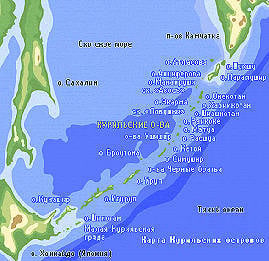 A proposal was also made to convene a special conference on the payment of reparations by Japan “with the obligatory participation of the countries subjected to the Japanese occupation, namely, China, Indonesia, the Philippines, Burma, and inviting Japan to this conference”.
A proposal was also made to convene a special conference on the payment of reparations by Japan “with the obligatory participation of the countries subjected to the Japanese occupation, namely, China, Indonesia, the Philippines, Burma, and inviting Japan to this conference”.The Soviet delegation asked the conference participants to discuss these USSR proposals. However, the United States and its allies refused to make any changes to the draft and September 8 put it to the vote. Under these conditions, the Soviet government was forced to refuse to sign a peace treaty with Japan on American terms. The representatives of Poland and Czechoslovakia did not put their signatures under the agreement.
Rejecting the amendments proposed by the Soviet government on the recognition by Japan of the full sovereignty of the USSR and the PRC over the territories that had passed to them in accordance with the agreements of the members of the anti-Hitler coalition, the drafters of the treaty text could not fail to take into account the Yalta and Potsdam agreements. The text of the treaty included a clause stating that “Japan waives all rights, rights and claims to the Kuril Islands and to that part of Sakhalin Island and the adjacent islands, which Japan acquired sovereignty over the Portsmouth Treaty of 5 September 1905 of September” . By including this clause in the text of the treaty, the Americans did not at all strive to "unconditionally satisfy the claims of the Soviet Union," as stated in the Yalta Agreement. On the contrary, there is plenty of evidence that the United States deliberately did business to ensure that, even if the USSR signed the San Francisco Treaty, the contradictions between Japan and the Soviet Union persisted.
It should be noted that the idea of using the USSR's interest in returning South Sakhalin and the Kuril Islands to bring discord between the USSR and Japan existed in the US State Department since the preparation of the Yalta Conference. The materials developed for Roosevelt specifically noted that "the assignment of the South Kuril Islands to the Soviet Union would create a situation that would make it difficult for Japan to reconcile ... If these islands are turned into an outpost (of Russia), there will be a constant threat for Japan." In contrast to Roosevelt, the Truman administration decided to take advantage of the situation and leave the question of South Sakhalin and the Kuril Islands as if in a “suspense”.
Protesting against this, Gromyko declared that "there should be no ambiguity in solving territorial issues in connection with the preparation of a peace treaty." The United States, being interested in preventing a final and comprehensive settlement of Soviet-Japanese relations, sought precisely such "ambiguities." How else can the American policy be interpreted so that, by including in the text of the treaty, Japan’s refusal of South Sakhalin and the Kurile Islands, at the same time, prevents Japan from recognizing the sovereignty of the USSR over these territories? As a result, the efforts of the United States created a strange, if not absurd situation, in which Japan abandoned these territories, as it were, without any definition, in whose favor this refusal is being committed. And this happened when South Sakhalin and all the Kuril Islands in accordance with the Yalta Agreement and other documents were already officially incorporated into the USSR. Of course, it was not by chance that the American drafters chose not to enumerate all the Kuril Islands in the text, which Japan refused, knowingly leaving a loophole for the Japanese government to claim their part, which was done in the subsequent period. It was so obvious that the British government even tried, though unsuccessfully, to prevent such a clear departure from the Big Three's agreement - Roosevelt, Stalin and Churchill - in Yalta.
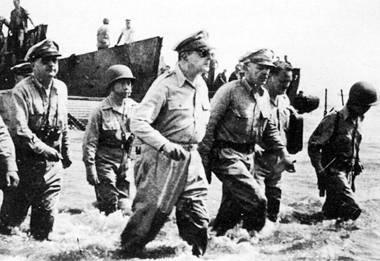 The landing of American troops in the Philippines. In the foreground, General MacArthur. October 1944
The landing of American troops in the Philippines. In the foreground, General MacArthur. October 1944The memorandum of the British embassy to the US State Department of 12 in March 1951 stated: "In accordance with the Livadia (Yalta) Agreement signed by 11 in February 1945, Japan must cede the Soviet Union South Sakhalin and the Kuril Islands." In the American response to the British, it was stated: "The United States believes that a precise definition of the limits of the Kuril Islands should be subject to a bilateral agreement between the Japanese and Soviet governments or should be legally established by the International Court of Justice." The US position contradicted Memorandum No. 29 / 1946 issued by the Commander-in-Chief of the Allied Powers, General MacArthur, issued by 677 in January 1 to the Japanese imperial government. It clearly and unequivocally stated that all the islands north of Hokkaido, including the “Habomanjo Islands Group, including Susio, Yuri, Akiuri, Sibotsu and Taraku Islands, are excluded from the jurisdiction of the state or administrative authority of Japan. and also the island of Sikotan (Shikotan) ". To secure Japan in pro-American anti-Soviet positions, Washington was ready to consign basic documents of the military and post-war period to oblivion.
On the day of the signing of a separate peace treaty, a Japanese-American “security treaty” was signed at the club of non-commissioned officers of the American army, which meant the preservation of US military-political control over Japan. According to Article I of this treaty, the Japanese government granted the United States "the right to deploy ground, air, and naval forces in and near Japan." In other words, the territory of the country on a contractual basis turned into a springboard from which American troops could carry out military operations against neighboring Asian states. The situation was aggravated by the fact that, due to the self-seeking policy of Washington, these states, primarily the USSR and the PRC, formally remained at war with Japan, which could not but affect the international situation in the Asia-Pacific region.
Modern Japanese historians and politicians differ in their assessments of the refusal of Japan from South Sakhalin and the Kuril Islands contained in the text of the peace treaty. Some people demand the abolition of this clause of the treaty and the return of all the Kuril Islands up to Kamchatka. Others are trying to prove that the South Kuril Islands (Kunashir, Iturup, Habomai and Shikotan) are not included in the concept of the Kuril Islands, which Japan refused in the San Francisco Treaty. Proponents of the latest version state: “... There is no doubt that, according to the San Francisco Peace Treaty, Japan refused the southern part of Sakhalin and the Kuril Islands. However, the addressee of the ownership of these territories was not defined in this agreement ... The Soviet Union refused to sign the San Francisco Treaty. Therefore, from a legal point of view, this state does not have the right to take advantage of this treaty for itself ... If the Soviet Union signed and ratified the San Francisco Peace Treaty, this would probably strengthen the opinion of the States parties to the treaty on the validity of the position of the Soviet Union, that the southern part of Sakhalin and the Kuril Islands belong to the Soviet Union. ” In fact, in the 1951 year, having officially fixed its refusal from these territories in the San Francisco Treaty, Japan once again confirmed its agreement with the terms of unconditional surrender.
The refusal of the Soviet government to sign the San Francisco Peace Treaty sometimes in our country is interpreted as a mistake of Stalin, a manifestation of the inflexibility of his diplomacy, weakened the position of the USSR in defending the rights to possession of South Sakhalin and the Kuril Islands. In our opinion, such assessments indicate a lack of consideration for the specifics of the then international situation. The world entered a long period of the Cold War, which, as the war in Korea showed, could at any time grow into a “hot one”. For the Soviet government at that time, relations with the military ally of the People’s Republic of China were more important than relations with Japan which finally came over to the US side. Moreover, as subsequent events showed, the signature of the USSR under the text of a peace treaty proposed by the Americans did not guarantee Japan’s unconditional recognition of the sovereignty of the Soviet Union over the Kuril Islands and other lost territories. This was to be achieved at the direct Soviet-Japanese negotiations.
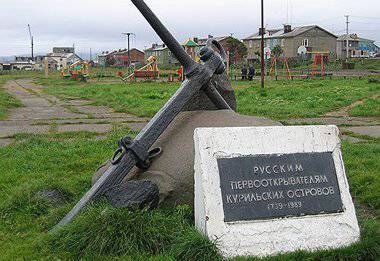 Blackmail Dulles and voluntarism Khrushchev
Blackmail Dulles and voluntarism KhrushchevThe conclusion of a military alliance between Japan and the United States seriously hampered the post-war Soviet-Japanese settlement. By a unilateral decision of the American government, the Far Eastern Commission and the Allied Council for Japan were liquidated, through which the USSR sought to influence the democratization processes of the Japanese state. Anti-Soviet propaganda intensified in the country. The Soviet Union was once again considered a potential military adversary. However, the Japanese ruling circles were aware that the lack of normal relations with such a large and influential state as the USSR does not allow the country to return to the world community, impedes mutually beneficial trade, dooms Japan to a rigid link to the United States, and seriously limits the independence of foreign policy. Without normalizing relations with the USSR, it was difficult to count on Japan joining the UN, establishing diplomatic relations with the socialist countries, primarily with the PRC.
Unsettled relations with Japan did not meet the interests of the Soviet Union either, because it did not allow establishing trade with its far-eastern neighbor, which quickly restored its economic power, hampered cooperation in such important sectors for both countries as fishing, prevented contacts with Japanese democratic organizations and, as a result, contributed to the increasing involvement of Japan in the anti-Soviet political and military strategy of the United States. The one-sided orientation towards the United States caused discontent among the Japanese people. An increasing number of Japanese from various backgrounds began to demand a more independent foreign policy, the normalization of relations with neighboring socialist countries.
At the beginning of 1955, the representative of the USSR in Japan appealed to Foreign Minister Mamoru Shigemitsu with a proposal to begin negotiations on the normalization of Soviet-Japanese relations. After a lengthy debate about the venue for meetings of diplomats of the two countries, a compromise was reached - authorized delegations were to arrive in London. 3 June in the building of the USSR Embassy in the British capital began the Soviet-Japanese negotiations on ending the state of war, concluding a peace treaty and restoring diplomatic and trade relations. The Soviet delegation was headed by the well-known diplomat J. A. Malik, who during the war years was the Soviet ambassador to Japan, and then with the rank of deputy foreign minister — the representative of the Soviet Union at the UN. The Japanese government delegation was headed by a Japanese diplomat with the rank of ambassador Syun-ichi Matsumoto, close to Prime Minister Ichiro Hatoyama.
In his opening speech at the opening of negotiations, the head of the Japanese delegation noted that “almost 10 years have passed since the day when, unfortunately, a state of war arose between both states. The Japanese people sincerely wish the resolution of a number of open questions that have arisen over the years and the normalization of relations between the two states. ” At the next meeting, Matsumoto read out a memorandum that the Japanese side proposed to put in the basis of the upcoming talks. In this memorandum, the Japanese Ministry of Foreign Affairs set forth the following conditions for restoring relations between the two countries: the transfer of the Kuril Islands and South Sakhalin to Japan, the return of Japanese war criminals convicted in the Soviet Union and the positive resolution of issues related to Japanese fishing in the North-West Pacific, and also assistance to the admission of Japan to the UN, etc. At the same time, the Japanese side did not conceal that the focus of the negotiations would be on “resolving the territorial problem”.
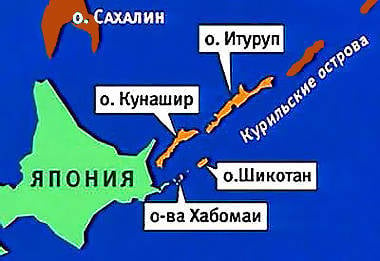 Map of the so-called "disputed territories".
Map of the so-called "disputed territories".The position of the Soviet Union was that, having confirmed the results of the war that had already taken place, to create conditions for the all-round mutually beneficial development of bilateral relations in all fields. This was evidenced by the proposed Soviet-Japanese peace treaty proposed by 14 on June 1955 by the Soviet delegation. It envisaged the termination of the state of war between both countries and the restoration of official relations between them on the basis of equality, mutual respect for territorial integrity and sovereignty, non-interference in internal affairs and non-aggression; reaffirmed and concretized the existing international agreements concerning Japan, signed by the Allies during the Second World War.
The Japanese delegation, fulfilling a government directive, filed claims on "the islands of Habomai, Shikotan, the Tishima archipelago (the Kuril Islands) and the southern part of Karafuto Island (Sakhalin)." The draft agreement proposed by the Japanese side was written down: “1. In the territories of Japan occupied by the Union of Soviet Socialist Republics as a result of the war, on the day this Treaty enters into force, Japan’s sovereignty will be fully restored. 2. The troops and civil servants of the Union of Soviet Socialist Republics currently in the territories indicated in paragraph 1 of this article must be withdrawn as soon as possible, and, in any case, no later than at the end of 90 days from the date of entry into force actual agreement".
However, soon Tokyo realized that an attempt to radically revise the outcome of the war was doomed to failure and would only lead to an aggravation of bilateral relations with the USSR. This could disrupt negotiations on the repatriation of convicted Japanese prisoners of war, reaching an agreement on fisheries, and blocking the decision on the admission of Japan to the UN. Therefore, the Japanese government was ready to reach an agreement to limit its territorial claims to the southern part of the Kuriles, saying that it allegedly was not subject to the San Francisco Peace Treaty. This was clearly a far-fetched statement, because on the Japanese maps of pre-war and wartime, the South Kuril Islands were part of the geographical and administrative concept of "Tishima", that is, the Kuril archipelago.
In putting forward the so-called territorial issue, the Japanese government was aware of the illusory nature of hopes for any serious compromises on the part of the Soviet Union. The secret instruction of the Japanese Foreign Ministry envisaged three stages of making territorial demands: “First, demand the transfer of all the Kuril Islands to Japan with a view to further discussion; then, stepping back a little, seek Japan’s concession to the southern Kuril Islands by "historical reasons, "and, finally, to insist on at least transferring the Habomai and Shikotan islands to Japan, making this requirement an indispensable condition for the successful completion of negotiations.
The fact that the final goal of diplomatic bargaining was precisely Habomai and Shikotan was repeatedly said by the Japanese Prime Minister himself. Thus, during a conversation with the Soviet representative in January 1955, Hatoyama stated that "Japan will insist on negotiating the transfer of the islands of Habomai and Shikotan to it." There were no other territories. Responding to accusations from the opposition, Hatoyama emphasized that the issue of Habomai and Shikotan should not be confused with the question of all the Kuril Islands and South Sakhalin, which was resolved by the Yalta Agreement. The prime minister has repeatedly made it clear that Japan, in his opinion, has no right to demand the transfer of all the Kuriles and South Sakhalin to her and that he does not in any way regard this as an indispensable precondition for the normalization of Japanese-Soviet relations. Hatoyama also acknowledged that since Japan refused the Kuril Islands and South Sakhalin under the San Francisco Treaty, it has no reason to demand the transfer of these territories to it.
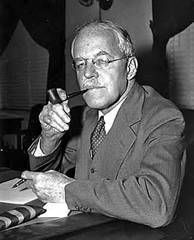 US Secretary of State J. Dulles.
US Secretary of State J. Dulles.Demonstrating its dissatisfaction with this position of Tokyo, the US government refused in March 1955 to accept the Japanese foreign minister in Washington. Unprecedented pressure on Hatoyama and his supporters began in order to prevent a Japanese-Soviet settlement.
The Americans were invisibly present at the London talks. It came to the point that State Department officials forced the leadership of the Japanese Foreign Ministry to acquaint them with Soviet notes, diplomatic correspondence, reports from the delegation and Tokyo’s instructions on negotiation tactics. In the Kremlin, this was known. In a situation where the failure of negotiations would have pushed Japan away from the USSR towards the United States even more, the then head of the Soviet Union, N. S. Khrushchev, set out to "organize a breakthrough" by proposing a compromise solution to a territorial dispute. In an effort to bring the negotiations out of the impasse, he instructed the head of the Soviet delegation to propose an option according to which Moscow agreed to transfer the islands of Habomai and Shikotan to Japan, but only after signing a peace treaty. A message on the readiness of the Soviet government to transfer Japan to the Habkai and Shikotan islands in the vicinity of Hokkaido was made on August 9 in an informal setting during a conversation between Malik and Matsumoto in the garden of the Japanese embassy in London.
Such a serious change in the Soviet position greatly surprised the Japanese and even caused confusion. As the head of the Japanese delegation, Matsumoto, later acknowledged, when he first heard the Soviet proposal about his readiness to transfer the islands of Habomai and Shikotan to Japan, he “did not believe his ears at first,” and “was very happy in his soul.” And this is not surprising. After all, as shown above, the return of precisely these islands was the task of the Japanese delegation. In addition, receiving the Habomai and Shikotan, the Japanese legally expanded their fishing zone, which was a very important goal of normalizing Japanese-Soviet relations. It seemed that after such a generous concession, negotiations should have been quickly completed with success.
However, what was beneficial to the Japanese, did not suit the Americans. The USA openly opposed the conclusion of a peace treaty between Japan and the USSR on the conditions proposed by the Soviet side. Putting strong pressure on Hatoyama’s cabinet, the US government did not stop in front of direct threats. US Secretary of State J. Dulles warned the Japanese government in October 1955 that the expansion of economic ties and the normalization of relations with the USSR "may become an obstacle to the implementation of the assistance program for Japan developed by the US government." Subsequently, he “severely punished the US ambassador to Japan, Allison and his assistants, to prevent the successful conclusion of the Japanese-Soviet negotiations.”
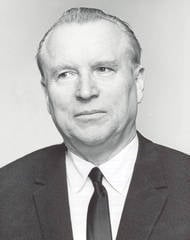 Permanent Representative of the USSR to the UN Ya. A. Malik.
Permanent Representative of the USSR to the UN Ya. A. Malik.Contrary to Khrushchev's calculations, it was not possible to bring the negotiations out of the impasse. His ill-conceived and hasty concession led to the opposite result. As it happened before in the Russian-Japanese relations, Tokyo perceived the proposed compromise not as a generous gesture of goodwill, but as a signal to toughen the territorial requirements imposed on the Soviet Union. The principal assessment of Khrushchev's unauthorized actions was given by one of the members of the Soviet delegation at the London talks, later Academician of the Russian Academy of Sciences S. L. Tikhvinsky: “I. A. Malik, acutely experiencing Khrushchev’s dissatisfaction with the slow pace of negotiations and not consulting with the rest of the delegation, prematurely expressed in this conversation with Matsumoto the delegation’s approved Politburo of the CPSU Central Committee (that is, N. S. Khrushchev himself) position, not having exhausted the defense of the main position in the negotiations. His statement caused at first bewilderment, and then joy and further exorbitant demands from the Japanese delegation ... The decision of N. S. Khrushchev to renounce sovereignty over part of the Kuril Islands in Japan was a rash, voluntaristic act ... The assignment of Japan to part of Soviet territory, to which without permission The Supreme Soviet of the USSR and the Soviet people went to Khrushchev, destroyed the international legal basis of the Yalta and Potsdam agreements and contradicted the San Francisco Peace Treaty, which was for iksirovan Japan's renunciation of South Sakhalin and the Kuril Islands ... "
Evidence that the Japanese decided to wait for additional territorial concessions from the Soviet government was the termination of the London talks.
Since January 1956, the second stage of the London talks began, which, due to the obstruction of the US government, also did not lead to any result. 20 March 1956, the head of the Japanese delegation was recalled to Tokyo, and, to the satisfaction of the Americans, the negotiations had almost stopped.
Moscow carefully analyzed the situation and by its actions sought to push the Japanese leadership to an understanding of the urgent need for the earliest possible settlement of relations with the Soviet Union, even in spite of the US position. The negotiations in Moscow on fishing in the northwestern Pacific Ocean helped break the deadlock. 21 March 1956 published a decree of the Council of Ministers of the USSR “On the protection of stocks and regulation of salmon fishing on the high seas in areas adjacent to the territorial waters of the USSR in the Far East”. It was announced that during the period of salmon spawning, their catch was limited to both Soviet and foreign organizations and citizens. This ruling caused a stir in Japan. In the absence of diplomatic relations with the USSR, it was very difficult to obtain licenses for salmon fishing established by the Soviet side and harmonize catch volumes. Influential fishery circles of the country demanded that the government resolve the problem as soon as possible, namely before the end of Putin.
Fearing growing dissatisfaction in the country by delaying the issue of restoring diplomatic and trade and economic relations with the USSR, the Japanese government urgently sent the Minister of Fisheries, Agriculture and Forestry Ichiro Kono to Moscow at the end of April, who had to gain an understanding of the difficulties for Japan at the negotiations with the Soviet government . In Moscow, Kono negotiated with the top officials of the state and took a constructive position, which made it possible to quickly reach an agreement. 14 May was signed by the bilateral Convention on Fisheries and the Agreement on Assistance to People in Distress at Sea. However, the documents entered into force only on the day of the restoration of diplomatic relations. This required the Japanese government to decide on the early resumption of negotiations on the conclusion of a peace treaty. Kono, on his own initiative, invited the Soviet leaders to return to the negotiating table for the delegations of the two countries.
A new round of negotiations was held in Moscow. The Japanese delegation was led by Foreign Minister Shigemitsu, who again began to convince his interlocutors of the “vital need for Japan” of the islands of Kunashir and Iturup. However, the Soviet side firmly refused to negotiate on these territories. Since the escalation of tension in the negotiations could lead to the refusal of the Soviet government and the earlier promise made about Habomai and Shikotan, Shigemitsu began to lean towards ending fruitless discussion and signing a peace treaty on the proposed Khrushchev terms. 12 August, the Minister said in Tokyo: “The negotiations have come to an end. Discussions are exhausted. All that could be done was done. It is necessary to define our line of conduct. Further delay can only hurt to hit our prestige and put us in an awkward position. It is possible that the issue of the transfer of Habomai and Shikotan to us will be questioned. ”
And the Americans again rudely intervened. In late August, without concealing his intention to thwart the Soviet-Japanese negotiations, Dulles threatened the Japanese government that if, by a peace treaty with the USSR, Japan agrees to recognize the Soviet Kunashir and Iturup, the United States will forever retain the occupied Okinawa island and the entire Ryukyu archipelago. In order to encourage the Japanese government to continue making unacceptable demands for the Soviet Union, the United States went into direct violation of the Yalta Agreement. 7 September 1956, the State Department sent a memorandum to the Japanese government, stating that the United States does not recognize any decision confirming the sovereignty of the USSR over the territories, which Japan refused under the peace treaty. Playing on the nationalist feelings of the Japanese and trying to present themselves almost as defenders of Japan’s state interests, the US Department of State officials invented the following wording: “The US government concluded that the islands of Iturup and Kunashir (along with the islands of Habkoi and Shikotan, which are part of Hokkaido) were part of Japan and should be treated as belonging to Japan. ” Further, the note stated: "The United States viewed the Yalta Agreement simply as a declaration on the common goals of the countries participating in the Yalta Conference, and not as a valid final decision of these powers on territorial issues." The meaning of this “new” position of the United States was that the San Francisco Treaty allegedly left the territorial issue open, “without defining the affiliation of the territories that Japan refused.” Thus, the rights of the USSR were put in doubt not only on the South Kurils, but also on South Sakhalin and all the Kuril Islands. It was a direct violation of the Yalta Agreement.
The open US intervention in the course of Japan’s negotiations with the Soviet Union, the attempts of threats and blackmail of the Japanese government provoked strong protests from both the opposition forces of the country and the leading media. At the same time, the criticism sounded not only to the United States, but also to its own political leadership, which meekly follows the instructions of Washington. However, the dependence, primarily economic, on the United States was so great that it was very difficult for the Japanese government to go against the Americans. Then Prime Minister Hatoyama assumed the entire responsibility, who believed that Japanese-Soviet relations could be settled on the basis of the conclusion of a peace treaty with the subsequent resolution of the territorial issue. Despite the illness, he decided to go to Moscow and sign a document on the normalization of Japanese-Soviet relations. In order to reassure his political opponents of the ruling party, Hatoyama promised to leave the post of prime minister after fulfilling his mission in the USSR. On September 11, Hatoyama sent a letter to the Chairman of the USSR Council of Ministers, in which he declared his readiness to continue negotiations on the normalization of relations with the condition that the territorial issue will be discussed later. October 2 The 1956 Cabinet of Ministers authorized a Japanese government delegation headed by Prime Minister Hatoyama to go to Moscow. The delegation included Kono and Matsumoto.
Nevertheless, the harsh pressure from the United States and anti-Soviet circles in Japan did not allow to achieve the goal set - to conclude a full-scale Soviet-Japanese peace treaty. To the satisfaction of the US Department of State, the Japanese government, for the sake of ending the state of war and restoring diplomatic relations, agreed to sign not a treaty, but a Soviet-Japanese joint declaration. This decision was forced on both sides, because Japanese politicians, looking to the United States, until recently insisted on the transfer of Japan, besides Habomai and Shikotan, also Kunashir and Iturup, and the Soviet government strongly rejected these claims. This is evidenced, in particular, by Khrushchev’s intensive negotiations with Minister Kono, which lasted literally until the day of the signing of the declaration.
In an interview with Khrushchev on October 18, Kono proposed the following version of the agreement: “Japan and the USSR agreed to continue, after the establishment of normal diplomatic relations between Japan and the USSR, negotiations on the conclusion of a Peace Treaty involving the territorial issue.
At the same time, the USSR, meeting the wishes of Japan and taking into account the interests of the Japanese state, agreed to transfer the islands of Habomai and Sikotan to Japan, however, that the actual transfer of these islands to Japan will be made after the conclusion of the Peace Treaty between Japan and the USSR. ”
Khrushchev said that the Soviet side generally agrees with the proposed option, but asks to exclude the expression “including the territorial issue”. The request to remove the mention of the "territorial issue" Khrushchev explained as follows: "... If you leave this expression, you might think that between Japan and the Soviet Union, besides Habomai and Shikotan, there is still some kind of territorial issue. This can lead to misinterpretation and misunderstanding of the documents that we intend to sign. ”
Although Khrushchev called his request “a remark of a purely editorial character,” in fact, it was a matter of principle, namely, Japan’s de facto agreement that the territorial problem would be limited to the question of ownership of only the islands of Habomai and Shikotan. The next day, Kono told Khrushchev: “After consulting with Prime Minister Hatoyama, we decided to accept Mr. Khrushchev’s proposal to delete the words включ including the territorial issue’ ”. As a result of October 19 of 1956, the Joint Declaration of the Union of Soviet Socialist Republics and Japan was signed, in paragraph 9 of which the USSR agreed to “the transfer of Japan to Habomai Islands and Shikotan Island, however, that the actual transfer of these islands to Japan will be made after the Peace Treaty between the Union of Soviet Socialist Republics and Japan.
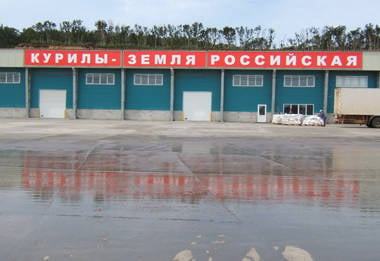 On November 27, the Joint Declaration was unanimously ratified by the House of Representatives of the Japanese Parliament, and on December 2, with three against, the House of Councilors. December 8 ratification of the Joint Declaration and other documents approved by the Emperor of Japan. On the same day, it was ratified by the Presidium of the Supreme Soviet of the USSR. Then December 12 1956, the ceremony of exchange of letters, took place in Tokyo, which meant the entry of the Joint Declaration and the protocol attached to it.
On November 27, the Joint Declaration was unanimously ratified by the House of Representatives of the Japanese Parliament, and on December 2, with three against, the House of Councilors. December 8 ratification of the Joint Declaration and other documents approved by the Emperor of Japan. On the same day, it was ratified by the Presidium of the Supreme Soviet of the USSR. Then December 12 1956, the ceremony of exchange of letters, took place in Tokyo, which meant the entry of the Joint Declaration and the protocol attached to it.However, the United States in the ultimatum continued to demand to abandon the conclusion of the Soviet-Japanese peace treaty on the terms of the Joint Declaration. The new Prime Minister of Japan, Nobusuke Kishi, yielding to US pressure, began to move away from negotiating a peace treaty. To "substantiate" this position, the demands were again put forward to return to Japan four South Kuril Islands. This was a clear departure from the provisions of the Joint Declaration. The Soviet government acted in strict accordance with the agreements reached. The USSR refused to receive reparations from Japan, agreed to release the Japanese war criminals who had served their sentences ahead of time, supported Japan’s request for admission to the UN.
A very negative impact on bilateral political relations was exerted by the Kisi cabinet course on the further involvement of Japan in the US military strategy in the Far East. The conclusion in 1960 of the new Japanese-American Security Treaty directed against the USSR and the People's Republic of China further complicated the issue of the border line between Japan and the USSR, because in the current military-political situation of the Cold War any territorial concessions to Japan would contribute to the expansion of the territory used by foreign troops. Moreover, the strengthening of military cooperation between Japan and the United States was very painfully perceived by Khrushchev personally. He was outraged by the actions of Tokyo, regarded them as an insult, disrespect for his efforts to find a compromise on the territorial issue.
The reaction of the Soviet leader was stormy. On his instructions, the Foreign Ministry of the USSR 27 on January 1960 sent a memorandum to the Japanese government stating that “only on condition that all foreign troops withdraw from Japan and sign a peace treaty between the USSR and Japan, the islands of Habomai and Shikotan will be transferred to Japan, as it was provided by the Joint Declaration of the USSR and Japan on October 19 1956 of the year. " Tokyo replied to this: “The Japanese government cannot approve the position of the Soviet Union, which put forward new conditions for implementing the provisions of the Joint Declaration on the territorial issue and thereby trying to change the content of the declaration. Our country will relentlessly seek the return of not only the Habomai Islands and Shikotan Islands, but also other original Japanese territories. ”
The attitude of the Japanese side to the 1956 Joint Declaration of the Year is as follows: “During the negotiations on concluding a peace treaty between Japan and the Soviet Union in October 1956, the top leaders of both states signed the Joint Declaration of Japan and the USSR, according to which the parties agreed to continue negotiations on a peace treaty and normalized interstate relations. Despite the fact that as a result of these negotiations, the Soviet Union agreed to transfer the Habomai island group and Shikotan island to Japan, the consent of the USSR was not received for the return of Kunashir Island and the Island of Iturup.
The Joint Declaration of Japan and the Soviet Union 1956 of the Year is an important diplomatic document that has been ratified by the parliaments of each of these states. This document is equal in its legal effect to the contract. It is not a document whose content could be changed only by one notice. The Joint Declaration of Japan and the USSR clearly stated that the Soviet Union agreed to transfer to Japan the group of Habomai islands and the island of Shikotan, and this program was not accompanied by any conditions that would constitute a reservation ... ”
It would be possible to agree with a similar interpretation of the meaning of the Joint Declaration, if it were not for one important “but”. The Japanese side does not want to admit the obvious - the indicated islands could by agreement only be subject to a transfer after the conclusion of a peace treaty. And this was the main and indispensable condition. In Japan, for some reason, they decided that the issue of Habomai and Shikotan had already been resolved, and in order to sign a peace treaty, the issue of Kunashir and Iturup was supposedly needed to be resolved, the transfer of which the Soviet government never agreed to. This position was invented in the 50 – 60 years by the forces that set a goal, setting forth obviously unacceptable conditions for Moscow, to block the process of concluding a Japanese-Soviet peace treaty for many years.
In an effort to get out of the “Kuril impasse”, the leaders of modern Russia have attempted to “reanimate” the situation of the Joint Declaration of the 1956 of the year. 14 November 2004, Russian Foreign Minister S. V. Lavrov, expressing the views of the Russian leadership, said: “We have always fulfilled and will continue to fulfill our commitments, especially ratified documents, but, of course, to the extent that our partners are ready to fulfill the same agreement. In the meantime, as we know, we were unable to reach an understanding of these volumes as we see it and as seen in the 1956 year. ”
However, in Japan, this gesture was not appreciated. 16 November 2004 of the year Japanese Prime Minister Junichiro Koizumi arrogantly remarked: “Until a clear agreement on Japan’s membership of all four islands, a peace treaty will not be concluded ...” Apparently recognizing the futility of further negotiations to find a compromise, President RF V.Putin 27 of September 2005 of the year declared with certainty that the Kuril Islands "are under the sovereignty of Russia, and in this part it does not intend to discuss anything with Japan ... This is enshrined in international law, this is result of the Second World War ".
This position is shared by the majority of the people of our country. According to repeated sociological polls, about 90 percent of Russians oppose any territorial concessions to Japan. At the same time about 80 percent consider that it is time to stop discussing this issue.
Information